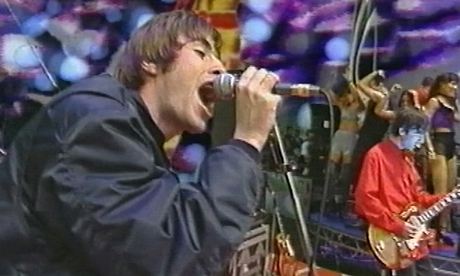
Given that we seem to have made appallingly little social or political progress since the mid-1990s, there is something very apt about the current obsession with revisiting the highlights and lowlights of 1994. It's difficult to move without coming up against an elaborate retrospective or 20th anniversary features dedicated to the death of Kurt Cobain or the birth of Britpop, those twin pop-cultural milestones that have been endlessly eulogised over the years to the point that their meaning is now as elusive as their status is iconic.
But for all that the current nostalgia fest can be cloying, its underlying motivation – the desire to work out what on earth happened to our collective psychology in those dazed, febrile mid-90s years – is surely not misplaced. Once we have swept aside the Britpop stereotypes and the hipster paraphernalia, what is the real legacy of that bewildering micro-era?
One useful effect of the focus on 1994 in recent coverage is that it helps to distinguish the starting point of the mid-90s cultural upsurge from the Cool Britannia portrait that has become embedded in post-1997 folklore. This is important because, as even a cursory glance at the major pop artefacts of 1994 makes plain, the demotic mood that began to swell at this time was initially much angrier, darker and more radical than we have come to remember. Suede's Dog Man Star and Pulp's His 'n' Hers, two of the biggest mainstream indie records of the year, were notable for their sullen portrayals of a dilapidated Britain riven by Thatcherism and failed by a decrepit counterculture; Irvine Welsh's Trainspotting, published in paperback in the summer of 1994, adopted a similar stance of belligerent, anti-Conservative populism.
Even Oasis, the most stereotyped and culpable of all so-called Britpop bands (and the focus of this week's 20th-anniversary nostalgia blow out) were in this early phase a very different proposition from the jaded Beatles parody of later years. The band's 1994 debut album Definitely Maybe might have led eventually to all kinds of unseemly imitations, but judged on its own terms it was – like the early Oasis phenomenon more generally – a scrappy, irascible statement at least in part a response to the resurgent class divides and precarious work culture of neoliberal Britain.
On the one hand, like Welsh's Trainspotting, early Oasis songs spoke of a Thatcherite scorched earth in which nothing was worth working for and the simulated escape route offered by drink and drugs seemed like the only option. But at the same time, and much more radically, Oasis also wrote songs – Live Forever and Acquiesce – of rare optimism and euphoria, songs that seemed to hint that some sort of spectacular collective recovery might be won in the teeth of the 80s nightmare.
What happened next is a textbook case study in how this variety of popular antagonism and optimism tends to be shut down and co-opted by a self-seeking establishment. By 1997 Oasis had been safely bought off and deposited in expensive London townhouses, and the restless energy of the preceding three years had melted into the covert Thatcherism of Blair's New Labour project. But if the powerbrokers and spin doctors of the later 90s were guilty of subverting the populist moment to their own ends, haven't we also been guilty of swallowing their Cool Britannia mythos whole while dismissing the pop culture of 1994-1997 as meaningless fancy dress? What would happen if we subverted the narrative of this period back again and tried to remember its subversive core?
In 1994, when a discredited Conservative government was in power but everyone knew that Labour would get in whenever an election was called, pop culture rushed into the gap and gave expression to a kind of surging, utopian longing that was both a desperate reaction to the effects of neoliberalism and an optimistic assertion that an alternative Britain was possible. As we seek to make our own escape from a conservative decade and try to awake from the nightmare of the past 20 years, we could do a lot worse than look beyond the stereotyped accounts of the 90s and try to recover their undertow of disaffection and supressed idealism.

